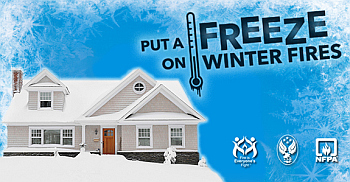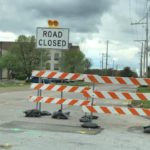 01/21/14 This week Indiana is expected to see another week of below freezing temperatures. As Hoosiers prepare for another blast of frigid air, the Indiana State Fire Marshal is asking citizens to exercise caution when using heating equipment, such as wood stoves or space heaters, to heat their homes.
01/21/14 This week Indiana is expected to see another week of below freezing temperatures. As Hoosiers prepare for another blast of frigid air, the Indiana State Fire Marshal is asking citizens to exercise caution when using heating equipment, such as wood stoves or space heaters, to heat their homes.
“We have already seen the tragic consequences of the improper use of heating equipment in Indiana this year,” said Indiana State Fire Marshal Jim Greeson. “Three children perished in a Hammond house fire as a result of a propane-fueled space heater being near combustible material.”
In addition to properly using heating equipment, residents should have a working smoke detector placed outside each sleeping area of the home and on each floor. Working smoke alarms double the chance of surviving a fire.
Things to keep in mind when using heating equipment:
Space heaters
· Space heaters need space. Keep heaters away from flammable materials such as bedding, drapes, clothing, etc.
· Use the proper grade of fuel for your liquid-fueled space heater and never use gasoline in any heater not approved for gasoline use.
· Refuel space heaters only in a well ventilated area and when the equipment is cool.
· Plug power cords only into outlets with sufficient capacity, never into an extension cord.
· Turn off space heaters whenever the room they are in is unoccupied.
· Turn off space heaters when you go to bed each night to avoid knocking them over in the dark.
Woodstoves or fireplaces
· Use only dry, seasoned wood in a fireplace or woodstove to avoid the build-up of creosote, an oily deposit that easily catches fire.
· Use only paper or kindling wood, not a flammable liquid, to start the fire. Do not use artificial logs in woodstoves.
· Make sure your fireplace has a sturdy screen to prevent sparks from flying into the room.
· Allow fireplace and woodstove ashes to cool before disposing in a metal container, which is kept a safe distance from your home.
Generators
· Never use a generator inside.
· Place emergency generators outdoors away from windows and doors to prevent fumes from entering the home.
· Have a carbon monoxide detector in the house that sounds an alarm when dangerous carbon monoxide levels are found.














